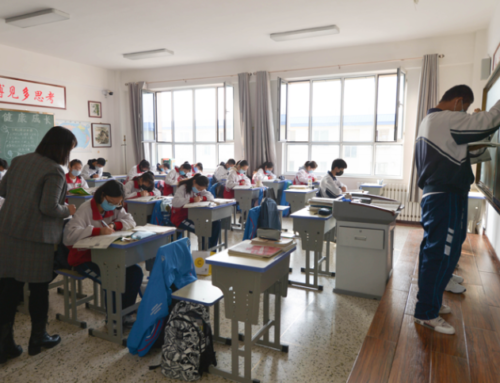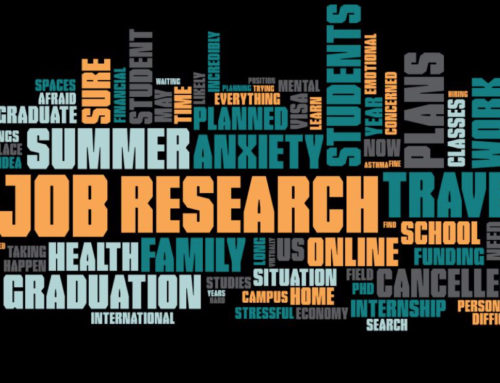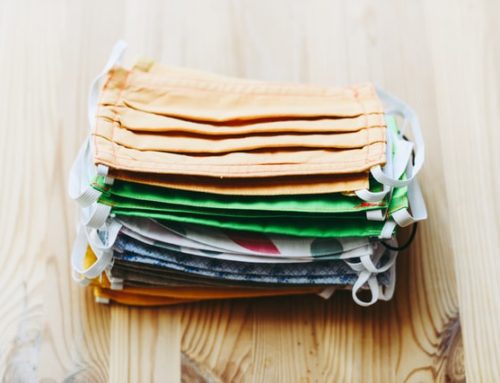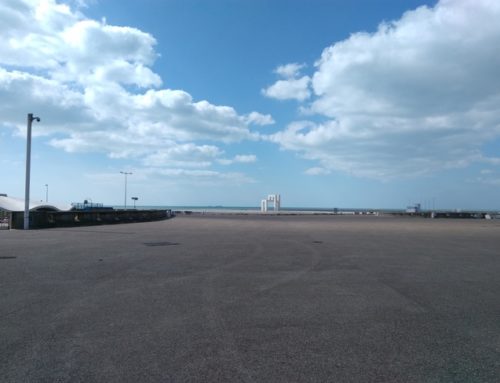The jury is still out whether Covid-19 has helped the cause of climate change or whether the virus has made climate change irrelevant as an issue in the brave new world into which we are heading. On one hand it is undeniable that due to Covid-19 there has been a drastic reduction in travel and transportation, leading to a significant reduction of carbon emissions in places such as China and the U.S.A. On the other hand it is unclear whether the economic downturn due to Covid-19 will not be met by an aggressive ratchet of emission-intensive economic activities that will undermine decades-long efforts by the global climate change negotiation process to have nation-states commit to emission reductions in order to move towards net-zero emission.
While we wait to see what happens – after all what other choice do we have – I found Covid-19 to provide a real world opportunity to learn of two different ways in which climate change can/does disrupt lives. In climate change science and policy, proxies are often used to study phenomenon too large in scope or too far back in the past or into the future on which to be safely speculated. Classic among these is the use of trapped air bubbles within ice cores as a proxy for ancient atmosphere. In speaking to my students at Johns Hopkins University (“Hopkins”) about their experiences following the entry of Covid-19 into the U.S.A., I realized that they were expressing two different modes of attending to the virus’s impact on their lives. Their experiences serve as possible proxies for understanding when climate change enters a life already undergoing turmoil as one more source of turmoil but that intensifies stress, versus when climate change re-orients one’s life entirely, putting it in the subjunctive mode of ‘if this then that,’ or negating choices entirely, giving a very different quality to stress. While it may strike the reader as strange to make student experiences with Covid-19 speak to issues of climate change, this grows out of my concern that we have yet to consider Covid-19 against the background of ecological crisis, to understand the signature of climate change upon it.
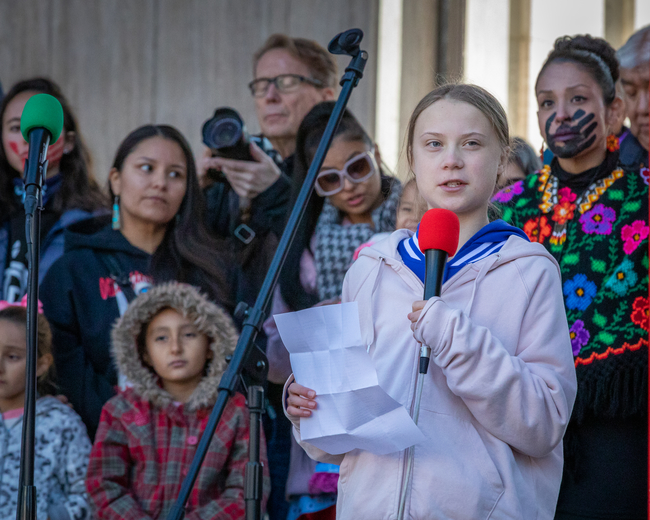
Greta Thunberg speaking on Earth Day 2018
I spoke with two students following Hopkins’ decision to shut down the university and send students away midway through the semester to undertake the rest of their semester’s studies through remote means, which was followed shortly afterwards by President Trump declaring a coronavirus travel ban to prevent people from entering the U.S.A. from countries where the epidemic was considerable. I also spoke with a recent graduate from our department to learn how his current institution is dealing with the crisis. Susan, as I will call one of the students, was in Florida in a bedroom in her father’s house when I spoke with her about two weeks after students had left Hopkins. Shree, the pseudonym for the second of the students, was holed up in his apartment in downtown Baltimore, when I spoke to him a few days later. In what follows I summarize their descriptions of their lives immediately following Hopkin’s decision and that of the coronavirus travel ban. I spoke with Franklin at that time and have continued to converse with him seeing a subtle evolution of his perspectives.Susan, a junior at Hopkins, related that her parents’ marriage had been unstable most of “our lives.” When she said “our lives,” I wondered if she meant over the course her conscious life with them or rather as they individually related the reasons for the failing marriage to her, recasting her life with them in terms of “instability.” I did not probe, but she was quick to follow up by saying they “tugged” at her. She explained, as if standing besides them seeking to represent their actions objectively, “they have their reasons for wanting to divorce,” and added gravely, “there are moral ambiguities in what they have done as human beings.” She didn’t want to choose between them. In the divorce her father got their liquid assets. Her mother got an apartment in a ski resort in Idaho. She broke off to indicate that she was aware of her privileged background that afforded her the likes of an education at Hopkins and skiing. Before Hopkins’ decision erupted into her life, Susan had hoped for a fun spring break in Idaho, skiing with her mother who was going to join her from Florida and relatives who lived in Idaho. Instead, she was out from school earlier than planned. Within a day of her arriving in Idaho, they shut down the mountain.
While her mother and she packed the apartment hurriedly in order to sell it, Susan had a “rough conversation” with her. She explained that her father had come to visit her earlier in the semester and told her “some stuff” about her mother so she knew that her mother was also implicated in the failure of the marriage.
Susan switched off from the account of what was happening in Idaho between her mother and herself to tell me about her maternal grandfather. He lived in a nursing home in Florida and was planning to come live with the mother but, with news of the virus’s spread in the U.S.A., her mother and her family had decided not to have the grandfather move in to better protect him from the virus. At that point Susan’s mother was still working at her job as an architect in downtown Miami and didn’t want to expose her father to anything.
As they hurriedly packed and moved boxes to the local post office to post to themselves, her father kept calling her urging her to return to Florida as soon as possible. He had a friend in Homeland Security who was hinting that all local flights would be banned. Susan speculated that rumors were rife and fear mongering at its height prior to Trump’s coronavirus travel ban. Her father’s constant calls started to register as stress inducing. But then she broke off from the chronology of her trip to say that while her father had been very problematic when she was younger, that “he could get mad and that wasn’t great,” he was now great.
After Hopkins closed early, she modified her plans to allow her to go to Idaho a few days earlier but deferred packing and moving out of her apartment in Baltimore till after spring break. Her plan was that she would drive down to Florida with some friends but pretty soon “everyone backed out.” The new plan was for her mother to return to Baltimore to help her pack and drive to Florida with her. They were going to fly from Salt Lake City, one of the airports serving the ski town in Idaho, to Denver and onwards to Baltimore. As they drove their rental car to Salt Lake they caught the local news that there had been an earthquake in Salt Lake earlier that day. It was only 5.7 on the Richter scale but sufficiently strong so as to cause damage to the airport. The airport control tower was not in service.
At that point midway to Salt Lake in the middle of the desert they decided to turn around to go to Boise, Idaho to catch a flight from there. As they made their reservations, they realized that their car, which was from a local rental service, had to be returned at Salt Lake City. As they couldn’t get a hold of anyone at the rental service afterhours, they continued on to the airport in Salt Lake City to do due diligence to the car company.
Susan compared Salt Lake City to a ghost town. There was no one on the streets of the city. There were a huge mess in the airport with piles of bricks here and there and tape cordoning off the areas. They dropped off this car only to get into another one to retrace their steps.
The trip back was daunting. The scale of the landscape out West is gigantic. There are tall granaries everywhere. Everything made one feel very small. Driving through the desert also made one feel small. Susan related that she started to feel strange, which was not helped by her religious mother asking if she thought that this was the end of the world and whether she had given more thought to being religious. Meanwhile all the flights out of Boise started to get cancelled so they had to keep stopping to rejig their itinerary. She began to feel adrift, unable to tell where she was coming from and where she was going, with the darkness of the night pressing in on her. She paused to tell me that she suffered from anxiety and that this situation had pushed her anxiety level to eleven. Finally, she stopped the car by the roadside to get out to get her orientation from the starlit sky. Once she saw a constellation that she recognized, she felt comforted and resumed driving to Boise.
In Boise airport they found that their flight was again cancelled. They had to wait in the airport for six hours to check in their bags. Her father, who was an ENT specialist, had continued calling this entire time warning them to only sit on seats that they had disinfected. He had sent them N95 facemasks that, he claimed, are the only ones that work. They sat on their designated seats for six hours wearing their masks and going to wash their hands in the bathroom every two hours. At that time no one was thinking about the virus, neither in their ski town nor in this airport. It was clear that their behavior and masks were frightening others around them, but they had no choice.
Back in Baltimore it was a repeat of their time in Idaho as they packed hurriedly and drove off to Florida. On the way Susan received a distressing call from a high school friend from Florida who had relocated to North Carolina because of a boyfriend who had turned out to be very abusive. The friend was separated from the man but her name wasn’t on the apartment that she lived in. He had had her thrown out of her apartment, put all her belongings in her car and had made off with her key. She was calling Susan, while sobbing beside her car with little or no ability to do anything. Susan persuaded her mother to make a stop in North Carolina to pick up her friend and bring her back to her family in Florida. In North Carolina she wanted to rush over to hug her friend but her mother held her back. It made her feel very odd to appear so dissociated in the face of obvious distress, but at least she managed to give her friend a ride back to Florida.
In Florida, Susan had to choose between staying at her mother’s or her father’s place. She decided that she would move between the two, whereas her younger brother, who was still in high school, had already opted to move in with his girlfriend. Susan got a bit of spring break because Florida beaches were still open, but when I spoke to her she knew that everything was going to change even more than it already had. There were more “snowbirds,” New Yorkers and others who migrate to Florida for the winters, in evidence than usual for this time of year. It suggested that New Yorkers who had homes in Florida had surged out of their state for Florida as the epidemic intensified there. The open beaches and the snowbirds couldn’t bode well for the virus in Florida. But at least she was at home. On a positive note, she was happy that Hopkins had decided to make grades satisfactory/unsatisfactory. She said that the undergraduates had started mobilizing for this as soon as there was an indication that Hopkins was going to go remote. She said that students knew better than to rely upon the administration to arrive at this ethical decision by themselves, seeing how they had behaved towards undergraduate protesters earlier in the year. So they had mobilized to besiege the administration and the S/U option was seen as a victory for the undergraduates.
Shree, an advanced graduate student at Hopkins, has been about to complete and defend his dissertation, with the possibility of a job in India afterwards. However, the coronavirus entirely upended not just these plans, also his entire existence as a foreign student in the U.S.A. It was like having the ground cut from under his feet. Within the course of a few weeks he went from being his usual self, taking pleasure in reading and sharing reading suggestions, watching films, and discussing his chapters to obsessing about the course of coronavirus and government missteps in his native India and in the United States, while completely stuck in place. He had almost stopped reading and writing, he said, spending hours on the Internet reading obsessively on the virus.
Before the virus materialized as a reality in his life in the form of the suspension of the course he was teaching at a nearby college to it being taught remotely and the complete stoppage of any department life within anthropology at Hopkins, Shree’s plan was to defend his dissertation in May. With only an introduction and conclusion and edits on his chapters to go, he foresaw enough time between completing his dissertation and defending it to visit India, to stay with his ailing parents and his brothers and their families, and to explore the potential job. However, when he became housebound in his apartment in downtown Baltimore at some distance from the university, he realized that his plans had evaporated into thin air and that he now had to contend with new contingencies of being a foreign student that hadn’t mattered to him earlier.
The coronavirus travel ban aimed to keep out foreign nationals from the U.S.A. So although Shree was free to leave the country to visit his family, it was looking very unlikely that he would be allowed back in even if he had the necessary paperwork, of which there was no guarantee as the Office of International Students was not operating with the University closed. He could complete his dissertation in a hurry, going against his perfectionist streak, but then he would have to leave the U.S.A. once and for all, with no guarantee that he could make good on the short term temporary employment measure (OPT or optional practical training visa) provided to those who complete courses of study in the U.S.A. In the best of times it is supposed to take three months for such visas to be processed and now it was not clear whether such processing was even continuing as the country went into lockdown. But even with an OPT rather than an F-1 or student visa in hand it was not clear that he would be allowed back in. At any rate, as Shree said, all the epidemiological models that he was consuming voraciously over the Internet suggested that the virus was going to surge in India and the U.S.A. in May. While the surge may not be related to actual rising numbers of the sick but rather better detection of the disease, why should anyone travel at such a time?
After years of training in the U.S.A. it was a bit galling to Shree that he had so few options to pursue an academic career in his adopted country, and that they rested on the whim of a near dictator who imposed a travel ban despite all urgings of the World Health Organization (WHO) that such bans, coming so late in the movement of the virus, did nothing more than confound the task of responding to the virus both internationally and took away focus from the need for national action and mitigation. So Shree decided to stay put, in his apartment, till his defense. But now he had a new challenge. Despite being very frugal, he didn’t have the savings to see him through the summer should he stay on to await his OPT. Hopkins summer intercession courses were already decided so he couldn’t earn the few thousand dollars graduate students earn for teaching these courses. The department, under receivership and the firm financial hands of the deans, would not budge to provide emergency funds because then there was the question of providing such funds to everyone. Like the undergraduates of Hopkins who felt that the administration was not on their side, the graduate students, who have felt this about the administration for a very long time, immediately mobilized to request the administration to extend their stipend year by an additional year to allow students to navigate this period of uncertainty. While the administration was considering this option, Shree did not think that this consideration would extend to him, as he was too close to the end already.
Franklin was into his third year of teaching in a social science department at a large research university. He carried a reasonable teaching load, but it was discussion intensive. Also he advised quite a number of undergraduates conducting research projects of their own. The university’s sudden decision to send students home and the extent of the disruption it caused in student lives had been documented in the New York Times. But what hasn’t received the same attention was the fact that many contingent staff were laid off within a week of the school’s closure and there was a hiring freeze. As regular messages from the university’s president indicated, the upper administration saw the protection of the university’s endowment and financial security as their highest priority. While Franklin wasn’t immediately worried for his job, he was growing worried that his efforts to grow his job by taking on more administrative duties could foiled if the university took to cutting any and all “non-essential” expenses.But Franklin’s proximate concerns were with trying to revive the spirit of discussion within his seminar-style classes over Zoom. He prided himself on being an excellent teacher and now conversations had nearly entirely stopped in his classes. He was also beset by students who had internalized high scripted formulae for success and who were now experiencing tremendous anxiety about how to maintain their performance, competitive internships and secure excellent grades. Franklin, in conversation with his colleagues, made several significant decisions that allowed Covid-19 to mark his pedagogy and instruction. Whereas others have been either advised or chose not to bring up mention of the pandemic within class discussions so as to not derail instruction, Franklin decided to tell his students that his courses were going to be marked pass/fail, to tell his students that they had done enough to pass. This was a policy that was already under discussion within the university, first offered as an option to everyone but then quickly make automatic for all. Franklin felt that his students needed the relief right away and made that decision for his course.
Initially he told them that the class space would be used however they liked. His introductory course wanted to keep moving forward with readings, which he reduced. As the conversation spontaneously came around to Covid-19, Franklin encouraged students to use class time and reading material (they were reading Frankfurt School and then Fanon) to discuss the crisis and its political and social ramifications. In a different class the students expressed interest in experimenting with different methods given that they couldn’t do fieldwork in the way it is conventionally imagined. So, with his encouragement, they took up sites and started following how stories were evolving across various media. As for his honors thesis writings, those planning to travel were revising their plans on what they would do when they were notified that they would not be allowed to travel. So now he is meeting them one-on-one to think about how one can still learn about what is going on, focusing on emergent social practices. And he told all of them that he was available to speak to each of them individually about anything that was on their mind. Franklin reported that several students cried openly in his classes when he made these announcements and changes. Inspired by the students’ positive response to his small but deliberate efforts to address Covid-19, to show it be central to all their lives, Franklin started to think ahead to what he might teach and research next that allowed literature and anthropology to be brought into conversation with the issues emergent with the virus.
Susan’s narrative is of the virus as just another element within a tumultuous life situation and contingency of events, accentuating her feeling of anxiety and separation from those around her. Shree’s is that of a life upended by the virus making him realize yet again/newly the vulnerability of his legal status as a foreign student in the U.S.A. Franklin’s is that of a teacher re-orienting his pedagogy and instruction around the virus. Three lives among the millions having to contend with the virus. While neither of them speaks of their experience and actions in terms of global warming, rising coastal waters, land loss or the slow poisoning of crops and bodies, by structural analogy or degrees of separation they do tell us how destructive forces stand to orient lives, either by eating away at their edges or upending them from within. And they stand to tell us that by securing individual lives and psychic states to meaningful ecological contexts, the fact of climate change may finally dawn on us.
Cite As: Khan, Naveeda. 2020. “Covid-19 and Climate Change in the Lives of Students.” In “Covid-19 and Student Focused Concerns: Threats and Possibilities,” Veena Das and Naveeda Khan, eds., American Ethnologist website, May 1 2020, [https://americanethnologist.org/features/collections/covid-19-and-student-focused-concerns-threats-and-possibilities/covid-19-and-climate-change-in-the-lives-of-students]
Naveeda Khan is an associate professor of anthropology and director of anthropology undergraduate studies at Johns Hopkins University.
